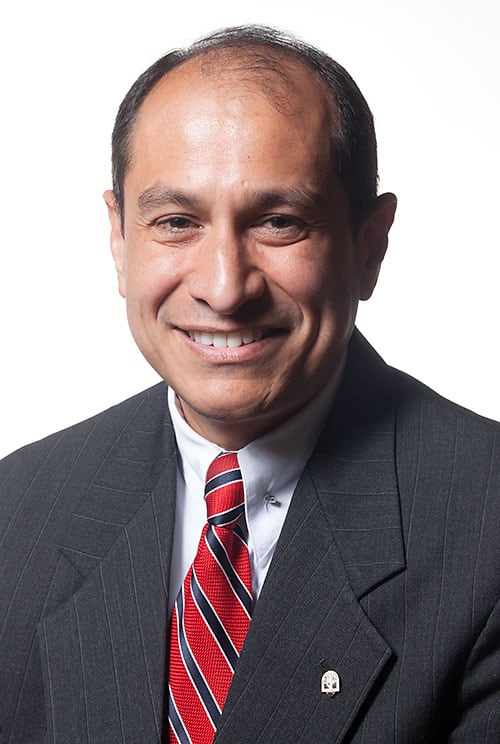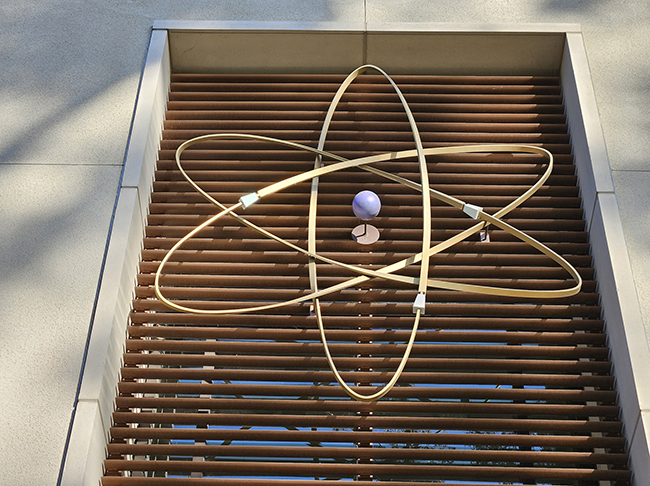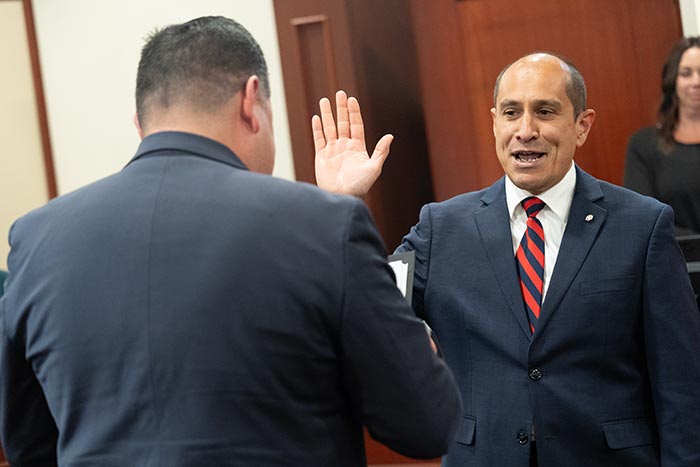Eight questions for eight candidates: Corey Calaycay

Sal Medina and Corey Calaycay (pictured) have been reelected to Claremont City Council’s District 5 and District 1 seats, respectively. Meanwhile, the race for CUSD Board of Education’s Trustee Area 5 remains too close to call. Photo/courtesy of City of Claremont

Why are you running again for city council?
I continue to have a great passion for serving this community; I enjoy working for the community. This year, I will be celebrating 43 years as a continuous Claremont resident. I’ve had the opportunity to serve on several community organization boards and leadership roles, including Friends of the Claremont Library, the Claremont Educational Foundation and, of course, Active Claremont. I believe both my time here as a resident and my experience on those boards has provided me a unique insight into the history, culture and values of Claremont that make this community the community we all know and love.
Over the time I’ve been on council, we’ve seen a lot of great projects completed. First and foremost, in terms of openness of governments, I reference the advancement of our laser fiche system, which allows our residents and members of the media the opportunity to access public documents, videos of council meetings, even live-streaming of council meetings from the comfort of their own homes or offices any time of the day at no charge. We had the completion of our Village expansion. We had the completion of Courier Place, our affordable housing development. We had the initiation of our sustainability plan that led to the creation of Sustainable Claremont.
The last program I would like to refer to is the Wilderness Park Master Plan. I’m particularly proud of that because one of my philosophies is “citizen-driven policy.” I think that is one of the best examples of citizen-driven policy—it took a great deal of time, but we got some good ideas out of that process.
Last week, you abstained from voting on a resolution affirming the city’s commitment to diversity and civil rights. Why not vote yes or no?
If you go back on my record, the council often wanted to opine on propositions and other issues such as this, and it was my feeling from the get-go that when you put it under the aura of a resolution, you’re implying that 36,000 residents believe this. So for many years on council, I would abstain on those matters.
As we moved into this past year, one of the issues that came forward was Proposition 57. We had a lot of feedback from residents with regards to crime and the increase of burglaries in the community. Our staff asked us to take a serious look at the possibility of taking a strong position on Prop 57—no. We did that, and shortly thereafter we received major pushback from some of the very same college students who were concerned about the sanctuary city issue. I acknowledged to them that I had always had a policy in the past of staying off of those issues—of abstaining—and I was likely going to go back to that policy from here on out from that particular experience. They applauded me at that time, because it was something they agreed with. But that’s the problem: when you take a policy like that, people support it when it suits their position. When it doesn’t, they may not feel so good about it. But when you say you’re going to do something, you have to be consistent.
My objective as an elected official is to try to keep our community united to focus on important issues related to city business, such as the water. That’s one in particular that there’s going to be some division on. If we decide to have other little battles with our residents, it creates ill feelings when you’re trying to work to bring the community together on some of those other important issues.
If elected, this will be your fourth term on council. What’s something new you can bring this time around?
The way I do business demonstrates that I am the kind of representative that is prepared to deal with whatever issue comes forward. We obviously can’t identify things like the Polyphagous Shot-Hole Borer that come up unexpectedly. Those things come up all the time, and that’s the thing people have to be cautious of. They can get very emotional about issues here today but, in the end, is your decision on who will represent you on city council going to serve you well in terms of other issues that are yet to come and unknown??How is that person going to respond? Is that person going to be responsive to you? Is that person going to demonstrate that he or she has an open mind and genuinely be willing to listen and try to incorporate your concerns in the decision-making process?
You’ve previously run your campaign on the ethos of fiscal responsibility. Does going forward with an appeal in the water trial fit in with that?
First and foremost, we have to remember this is something our citizens spoke heavily about. We have to weigh that, but we do have to consider our finances in the process. And that is the purpose of [the January 31 special meeting], to put all the information on the table and receive direct input from our residents at this point in time.
One of the points of appeal that I haven’t heard raised quite as much is the fact that Ojai did have their case go through the process relative to their community facilities district. The lower court in their case upheld their community facilities district. Golden State appealed, and not only did they uphold the community facilities district, they also opined relatively strongly on the use of eminent domain for this purpose. So that leaves the question in mind, does that have any conflict with the ruling of this judge? I hope that is one of the things that will be considered should we continue down that road.
But that also affects the finances because, again, if we determine there is a valid road to appeal, that does affect whether we’re on the hook for legal expenses. Of course, in all of these things, we have to keep in mind that there is a risk involved, and there are never any guarantees either way—even under the best conditions with the best legal representation, you’re never going to get a guarantee on a result. So the most important thing is to be listening very carefully to where our residents stand on this and take into context all the information we’re going to receive, including the finances.
We recently learned that the police facility bond measure was taken off the June ballot and will possibly appear in November. What’s taking so long?
In part, it’s some of what the [police facility ad hoc] committee requested. The committee wanted us to create solid plans for the facility. The council appropriated money to develop those plans and we still have yet to receive those plans. Part of it is following the same procedure we followed for Measure W—which we were highly criticized upon relative to Measure PS, and people felt that we jumped the gun, didn’t do enough community meetings to really educate people on the issue and invite more input. So, this is to assure we don’t make the same mistake the second time around because, frankly, I don’t believe in this particular circumstance, it is a situation of three strikes and you’re out. I think it’s potentially two strikes and you’re out.
In July, the council rejected a $28 million offer from the Gold Line Construction Authority to build a bridge over Indian Hill, even though we had until February 2017 to decide. Do you regret moving so fast?
It wasn’t just February 2017. Part of the challenge was that Gold Line had a timeline they were trying to meet to have a firmer proposal to submit for consideration as part of Measure M, which was already on the ballot in November. The one challenge with it is that there was a set amount we were provided with to do this. What was becoming clear, if we were going to try to meet some of the concerns of residents, is it was going to come in well in excess of the amount allotted, which would require another potential bond measure. In the case of Arcadia, they didn’t receive any appropriation from the Gold Line for their bridge—they actually put in a bond measure several years back for voters to approve that bridge.
You’ve referenced finances in the previous question—we have the water issue, we have the police station, voters just passed Measure G, they passed Measure M—I’m not sure what their level of excitement would be for yet another bond measure to try to meet what citizens were expecting with any sort of grade separation.
With so much development, do you think Claremont is losing it’s small town feel?
We have to be careful with it but at this point in time, unfortunately as the saying goes, the only thing that is certain in life is change. We have to be able to deal with that and we have to keep the city relevant. In so doing, we have to proceed cautiously. That is a challenge, because the face of Claremont is changing.
I recognize we have a lot of new residents in Claremont, and many of them feel the same thing we feel. They know there’s something here that they love and makes them want to live here, but a lot of times they can’t necessarily put their finger on it. That’s what I view has been the role of Claremont Heritage. One of the things I’m saddened by is the division that developed over the Pomona College Museum of Art. I know Heritage lost some members as a result of that and there’s a deep division. I’m hopeful we can work very hard as a community to bring people back, because I strongly believe that Claremont Heritage plays a strong role in keeping us educated about the history of this community. We have to have a fair balance. And that’s one of the things that’s important to me as a councilmember—in all of my decisions, I’m listening to that information and really thinking through the history and all the other points to assure we have a balanced decision.
If you had a magic wand, what is one thing you would change about Claremont?
A safe thing to wish for—being that we are the city of trees—would be that our stressed and unhealthy trees would be restored to good health and that we could eliminate the Shot-Hole Borer. That being said, there are many stories about magic wands and magic lamps and the moral of many of those stories is that you have to be careful what you wish for. Going back to our last question: change for the sake of change isn’t always a good thing. Part of that is also considering the things that you value and appreciate within your community that you don’t want to have changed.
I certainly hope that the people in this community recognize the role I play in trying to maintain the peace, to build bridges, to really listen to concerns and that they will allow me to continue to be a part of those good efforts on our city council.
—Matthew Bramlett
news@claremont-courier.com










0 Comments